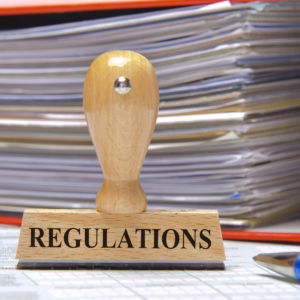Senate lawmakers hosted a hearing Wednesday to discuss how government can better balance regulations with small business needs.
Small business owners are subject to numerous regulations that dictate their business operations. The regulations are designed to protect workers while creating a level playing field among businesses. The question is when the regulations become overly burdensome.
The Senate Small Business and Entrepreneurship Committee held the hearing to discuss how best to implement fair regulations. The American Sustainable Business Council (ASBC) found 86 percent of small business owners believe regulations are necessary. Many business owners, however, are concerned with how aggressive they’ve become.
“Small businesses do not resent good, well thought out regulations,” ASBC Chairman Frank Knapp testified during the hearing. “As I mentioned, regulations can benefit small businesses. But we want them to be the least burdensome as necessary to achieve their intended goal and use common sense.”
Small businesses play a critical role in the economy. The Small Business Administration Office of Advocacy found small firms account for 99.9 percent of all businesses in the country. Small businesses are also responsible for 63 percent of new jobs.
The Regulatory Flexibility Act (RFA) was designed to counter excessive regulations when it was enacted in 1980. The law requires federal agencies to prepare an economic analysis on proposed regulations. National Association of Home Builders vice chairman Randy Noel argues the analyses are often inaccurate.
“The rulemaking process often goes off the rails with poorly informed and woefully inaccurate cost-benefit analyses,” Noel said during the hearing. “It is imperative that proposed rules consider the true cost, including indirect costs, of compliance for small businesses.”
Federal agencies under the law are also required to seek outside input from impacted industries. Knapp warns that process is also flawed since agencies usually consider comments from big businesses. He adds federal agencies should host frequent meetings locally to ensure better comments.
“Congress must provide some direction to address the problem of poor or non-existent economic impact analyses,” Noel said. “Economic analysis should be reviewed by a non-partisan, third party. Implementing these changes will undoubtedly improve the analysis and provide a more accurate accounting of the burdens small businesses face in complying with regulations.”
Knapp adds that federal agencies should also be better funded so they can actually fulfill their duties. Committee Chairman Jim Risch pushed back on whether more government is the solution. Noel politely disagreed that funding is an issue.
President Donald Trump has promised to help businesses struggling with burdensome regulations. He has built his presidency on creating opportunities for both business owners and employees. Former President Barack Obama, in contrast, believed the regulations were critical to protecting workers.
Obama instituted several significant changes during his time in office. The National Labor Relations Board changed how union elections are held, how companies can contract together and how workers are classified. The Department of Labor (DOL) tackled policy areas like overtime and federal contracting.
The Competitive Enterprise Institute noted in a coalition letter the labor department alone imposed $55.7 billion in regulatory costs on employers during the last administration. It adds that during that time the gross domestic product only averaged less than two percent while an increased number of people dropped out of the labor market.
Noel points to a recent regulation that governs crystalline silica as an example. Crystalline silica is a commonly used industrial material that could expose workers to fatal lung diseases. The Occupational Safety and Health Administration (OSHA) issued rules to protect those that work with the substance. Noel argues the agency overlooked that silica-related deaths decreased by 93 percent from 1968 to 2010.
The Environmental Protection Agency (EPA) has faced similar criticism for its regulatory proposals. The Clean Water Rule rule implemented new federal powers over small waterways such as wetlands, headwaters, and ponds. Critics contested the rule was a severe regulatory overreach. Trump has already begun dismantling the rule.

